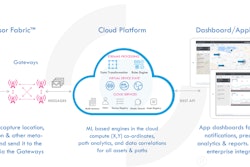
Let’s face it. In an industry where many companies are still trying to get a handle on their internal data—and some still even process much of their information manually—it’s hard to imagine a reality where buyers, suppliers, carriers and other supply chain partners all share data across one secure platform.
But realistic applications for blockchain will soon be realized, with many experts predicting widespread adoption within five years. Smart contracts are one blockchain application gaining traction, with the potential to offer immediate rewards.
Blockchain allows companies to create smart contracts based on programmable business logic, which can execute themselves autonomously and thereby save time and money by reducing friction and intermediaries.
Log in to view the full article
Let’s face it. In an industry where many companies are still trying to get a handle on their internal data—and some still even process much of their information manually—it’s hard to imagine a reality where buyers, suppliers, carriers and other supply chain partners all share data across one secure platform.
But realistic applications for blockchain will soon be realized, with many experts predicting widespread adoption within five years. Smart contracts are one blockchain application gaining traction, with the potential to offer immediate rewards.
Blockchain allows companies to create smart contracts based on programmable business logic, which can execute themselves autonomously and thereby save time and money by reducing friction and intermediaries.
In this format, traditional contracts are converted into computer code to form a digital agreement that is stored, replicated and supervised by the network of computers that run on the blockchain. The self-executing, digital contracts allow the chain to essentially hold funds in escrow until both parties meet their obligations.
“This helps make sure that all parties fully meet the conditions set in the contract,” explains Ray Young, co-founder and chief technology officer of Omnichain Solutions.
For instance, in a delivery scenario, Young says “a smart contract would ensure the trucking company only receives payment once the retailer confirms receipt of the shipment.”
Smart contracts can also help “prevent breaches and reinforce trust and accountability among everyone in the supply chain,” Young adds.
In fact, Sami Peltonen, vice president of purchase-to-pay product management at Basware, says smart contracts have the potential to eliminate fraud.
“Everybody has the same understanding of truth, so it is very difficult, if not even impossible, to do fraud in that context,” he explains.
But what really sets smart contracts apart is their potential to aid in achieving today’s supply chain Holy Grail—real-time visibility.
“You can build pretty advanced algorithms and business rules even without blockchain. Part of that value certainly can be done with today’s existing technologies and many of our customers are doing it. But when all parties are sharing the same data, it’s even closer to a real-time scenario, which will be important going forward,” Peltonen says.
A Function of Procurement
An area of supply chain that stands to benefit the most from smart contracts is procurement. Peltonen says the impact and promise of blockchain technology within B2B transactions across the supply chain and within the accounts payable function is quickly becoming more realistic. When it comes to the application of blockchain (and specifically smart contracts) within accounts payable, near-term benefits occur where you can:
1) Eliminate manual matching with automated payment approvals, making the accounts payable function more effective.
Peltonen says automating the accounts payable process based on procurement information using blockchain is one of the most intriguing use cases for the technology.
“Think about a world where basically all of the different parties in the supply chain share the same data. Buyers, suppliers, carriers—all of the parties—would be able to share the data. That provides huge opportunities for increasing efficiency and automation,” he explains.
For example, building a smart contract will eliminate associating the supplier’s invoice with corresponding purchase orders, he says, allowing you to define various checkpoints and ensure the purchase order has been delivered according to the expectations. In addition, you would be able to ensure or verify that the carrier hasn’t been adding extra costs.
“With that innovation you are then able to automate the downstream process, meaning the invoice handling,” Peltonen adds.
2) Revolutionize business processes, including managing DPO and cash flow and helping to mitigate supply chain disruption through close collaboration with suppliers on payment terms.
“Whenever both the buyer and supplier have exactly the same visibility of the purchase order—what has happened with the purchase order, the historical data and action loops—and when both have exactly the same understanding of what’s happening on the invoice, it ensures that when you want to automate your downstream accounts payable process, you always have the correct data,” Peltonen explains.
Omnichain’s Young points out that when all records are digitized and available to anyone in the blockchain network, it eliminates any doubts as to an agreement’s condition, transaction status or location of a product.
“It creates a unique, user economy among business partners, where all parties fulfill their responsibilities, payments are made when expected, and all goods arrive where and when they should,” he says, adding, “Overall, smart contracts lead to a more efficient and seamless supply chain.”
This increased supply chain visibility and partner trust also makes contract exceptions easier to identify and resolve.
“When this data is shared between the parties, you are able to see in real time where the difference is coming from. And the exceptions can then be handled in a more effective way, where the supplier can take care of processing the exception,” Peltonen says.
For example, in today’s supply chain, the buyer is typically the one trying to resolve conflict.
“If something goes wrong, such as the delivery is broken or the carrier adds an extra freight charge that wasn’t agreed upon in the contract, the buyer now has to resolve all of those conflicts,” Peltonen says. “But in a blockchain, we are able to involve all of the parties to do the exception handling, and in the end, it’s to everybody’s benefit. Conflicts are resolved fast.”
3) Realize cost savings by paying immediately and claiming discounts from suppliers.
Another benefit to smart contracts is the potential for dynamic payment or dynamic discounting. Smart contracts on a blockchain platform allow the supplier to immediately see that an invoice has been processed.
“To get the money faster, the supplier may be able to provide an opportunity for the buyer to pay right away using a dynamic discounting program,” Peltonen explains.
Data Capture
The benefits of a fully integrated buyer and supplier relationship with shared data are obvious, and blockchain will make that possible, further driving automation, data compliance and faster exception handling. But to really get the benefit of the ongoing development, Peltonen says “you need to be able to capture all of the data.
“That is a prerequisite that often the customers are not fully understanding or executing successfully,” he adds.
Basware encourages its customers to begin by congregating their data into a single platform. This will result in immediate benefits, but more importantly, Peltonen says as blockchain moves forward, “those companies that already have lots of data in a single place will see the best benefits of upcoming blockchain or AI-related developments.”
Unsolved Questions
A Beginner’s Guide to Smart Contracts by Blockgeeks, an online blockchain training technology educational platform, emphasizes that smart contracts are still far from perfect, citing the potential for bugs in the code and questions about government regulation. Basware’s Peltonen also emphasizes concerns around data privacy.
“Even though there are great benefits, at the same time, customers tend to be very sensitive with their data. Thus, sharing your data with various parties doesn’t always sound like a good idea,” he explains. “It’s a challenge that will be resolved, but there are no perfect solutions available right now. That is one of the reasons why it will still take some time before we are able to see broader adoption of blockchain applications.”
Gil Perez, senior vice president of IoT and digital supply chain at SAP, also warns of added costs smart contract implementation can carry.
SAP first implemented smart contracts on the hyperledger, but found that actual implementation was too expensive to justify the investment. Instead, they turned to multichain, which doesn’t have smart contracts at all.
“It’s much faster, more efficient and allows you to run everything at a significantly lower price point,” Perez says. “Smart contracts do have a cost associated with them. You need to consider when and how you want to use smart contracts, and when does it make sense to use it and where does the logic need to be?
“Smart contracts are great because they give us more flexibility, but it has a cost to it. People need to decide where and how they use blockchain in order to consider the business and financial implications of it,” he adds.
Follow Amy Wunderlin on Twitter.



















